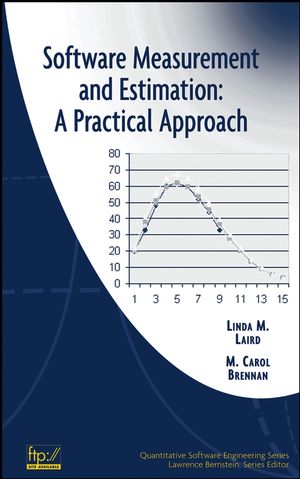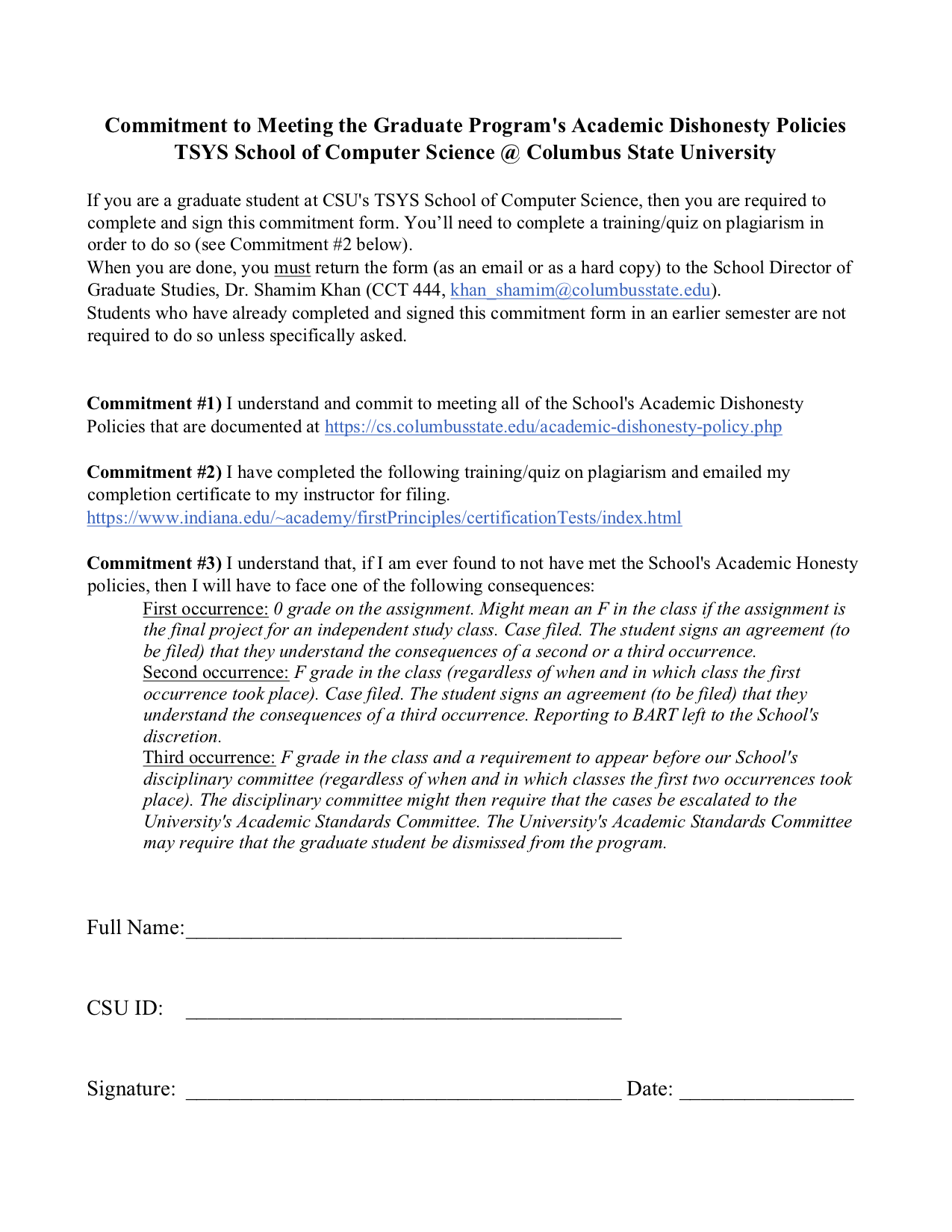Instructor Information
Dr. Hyrum D. Carroll
TSYS School of Computer Science
Columbus State University
CCT 442
(706) 507-8182
Office Hours
Class
| Section 01 | Section V01 |
|---|---|
| Tuesdays | (on-line) |
| 9:30 - 10:45 AM | (on-line) |
| CCT 408 | (on-line) |
| CRN: 20583 | CRN: 20251 |
Textbooks
Required |
Title: Software Measurement and Estimation: A Practical Approach Authors: Laird and Brennan Publisher: Wiley ISBN: 0-471-67622-5 |
Optional reference:
|
Title: Software Estimation: Demystifying the Black Art Author: Steve McConnell ISBN: 0735605351 |
Software Requirements
To complete all lessons, projects, and exams, you need:- Internet browser
- A text editor (e.g., MS Word)
- Internet access to the CougarVIEW (D2L) class site (How do I know if my computer will work with CougarVIEW (D2L Brightspace)?)
Course Prerequisites
Basic probability, statistics, algebra and software engineering principles are needed or permission of the instructor.Course Description
Study of software measurement and estimation with an introduction to financial measurements. Students will learn to measure and predict the size, complexity, and quality of software development projects by a variety of methods. Commercially available tools are used, as well as engineering rules, benchmarks, and a variety of predictive/estimation methodologies. Topics include but are not limited to: Develop estimates for software development and maintenance projects, how to communicate the estimates to others, and how to best represent the estimates in a formal contract, cognitive biases and administrative behaviors that affect the estimation process, use of parametric models and counting methods, Delphi, paired comparisons, functional sizing methods, quantifying and incorporating uncertainty, cost behaviors, cost objects, fixed, variable, mixed and step costs, calculating total budget, how measurement is used, applying software measurement, s/w measurement definition, process definition techniques, measuring quality, measurement and CMM, performance management measurement, statistical process control etc.Course Objectives
The students will be able to:- define efficient metrics for any software development activity/task
- assess the factors and issues that may affect software estimation
- estimate the size of a software project, its duration, and the effort needed to complete it
- measure and predict the quality of a software project
- recognize and apply the basic financial measurements that relate to software projects
Course Assessment
Learning Activities
- Textbook readings
- Quizzes
- Projects
- Assignments
- Midterm and Final Exams
Performance Evaluation
| Category | Percentage |
|---|---|
| Assignment and quizzes | 25% |
| Projects | 35% |
| Midterm | 20% |
| Final Exam | 20% |
Grading
Course letter grades are determined by the final course average according to the following chart:| Percentage | Grade |
|---|---|
| 90 – 100 | A |
| 80 – 89 | B |
| 70 – 79 | C |
| 60 – 69 | D |
| <60 | F |
Course Websites
The course schedule, assignment descriptions, syllabus, etc. are hosted at http://csc.columbusstate.edu/carroll/6180/. Grades, assignment submissions, quizzes, etc. are hosted in CougarVIEW. You are expected to monitor the websites and your CSU email account frequently (i.e., at least every other day).CougarVIEW
You can access the course through CougarVIEW at: cougarview.columbusstate.edu.Use your school credentials to access the site. If CougarVIEW will not let you in, go to the CSU Help Desk or call them at (706) 507-8199. If you are still having problems gaining access a day or so after the class begins, please e-mail me immediately.
Once you've entered CougarVIEW, you will see a list of courses you have access to. The CPSC 6180 course is listed as "Software Estimat and Measure". Next to this, you should see my name as the instructor. You may also see new discussion postings, new calendar postings, and new mail messages. Clicking on the name of the course will take you to the course's home page. If you do not see the "Software Estimat and Measure" course in the list, please e-mail me immediately.
Once you have clicked on the course's name and accessed the particular course itself, you will find a home page with links to other sections and tools, and a menu on the left-hand side. Feel free to explore the areas in the course.
If you need technical support related to the use of CougarVIEW, you can refer to any of the links located in the "Technical Resources" widget located on your "My Home" and your "Course Home" pages. If you cannot solve your problem after reviewing the knowledge base help pages, you can call help center 24-7 and talk to a Help Center agent. The number is 1-855-772-0423.
Lecture
Attendance is required by the university and will be recorded at the beginning of each class. If you can not make a class, please inform me and get the relevant materials from a classmate. Although you'll miss out on the attendance points for that day, you'll at least minimize the impact.Computers are permitted in lecture for note taking and completing exercises. Other activities such as web surfing, stock trading, and social networking are inappropriate. Not only do they distract you but also others.
Students that do not attend both of the first two lectures may be dropped from the course.
An audible cell phone ring and noise during class will require the possessor to bring fruit, cookies, or equivalent for the entire class during the next lecture time.
Additionally, all views are to be heard and engaged respectively. As scholars, we are expected to analyze subject matter critically and express reasonable positions that are based on logic and fact rather than on emotion.
Projects
They are due at 11:59 PM Eastern Time on the assigned due date (unless indicated otherwise). Late projects will be reduced by the following schedule (Sunday and Monday are counted as 1 day late):| # of days late | Penalty | |
|---|---|---|
| 1 | -10% | |
| 2 | -30% | |
| 3 | -50% | |
| ≥ 4 | -100% |
If an assignment contains portions that are more than 75% similar to other material (not provided by the instructor), zero points will be awarded. Additionally, the a BART incident may be recorded as well.
Students missing two or more projects will receive an F or FA in this course.
Advice for Succeeding in this Course
- Attend EVERY class.
- Be prepared for class by reading assigned material before class.
- Take notes in class.
- Review notes taken in class.
- Start working on the projects as soon as possible, and seek help as soon as needed. Do NOT wait for the last minute to work on your projects.
- Ask questions during class or after class. Do NOT wait until test time to ask all of your questions.
- Find study buddies to study together (but do your own work).
- Do your own work; zeros can drastically hurt your grade.
What To Do When You Get Stuck
General steps for addressing a coding challenge:- Isolate the problem and replicate it in the simplest form possible
- Search for answers (e.g., in the book, on-line, etc.)
- If you've already spent an hour trying to solve the problem, contact me during my office hours or via email. If you email me, mention what you've already attempted to solve the problem (for example, the steps above). (Note, if you email me a question, and then later figured out a solution, please send a second email indicating that it's resolved :)
Administrative Policies and Academic Resources
ADA and 504 Statement
If you have a documented disability as described by the Americans with Disabilities Act (ADA) and the Rehabilitation Act of 1973, Section 504, you may be eligible to receive accommodations to assist in programmatic and/or physical accessibility. We recommend that you contact the Center for Accommodation and Access located in Schuster Student Success Center, Room 221, 706-507-8755 as soon as possible. The Center for Accommodation and Access can assist you in formulating a reasonable accommodation plan and in providing support. Course requirements will not be waived but accommodations may be able to assist you to meet the requirements. Technical support may also be available to meet your specific need.Commitment to Meeting the Graduate Program's Academic Dishonesty Policies

Note, on-line sections must CC the instructor as well to receive points.
Student Complaint Process
Information and resources for student complaints and academic appeals are located at the following link on the Columbus State University website http://aa.columbusstate.edu/appeals/.Course Attendance Policy
Refer to the CSU Catalog (https://academics.columbusstate.edu/catalogs/current/regulations/undergraduate/index.php#attendance) for more information on class attendance and withdrawal.Discussion Etiquette
CSU is committed to open, frank, and insightful dialogue in all of its courses. Diversity has many manifestations, including diversity of thought, opinion, and values. Students are encouraged to be respectful of that diversity and to refrain from inappropriate commentary. Students as well as faculty should be guided by common sense and basic etiquette. The following are good guidelines to follow:- Never post, transmit, promote, or distribute content that is known to be illegal.
- Never post harassing, threatening, or embarrassing comments.
- If you disagree with someone, respond to the subject, not the person.
Student Responsibilities
As a student in this course, you are responsible to:- manage your time and maintain the discipline required to meet the course requirements,
- come to class prepared to ask questions to maximize your understanding of the material,
- complete all readings,
- complete all assignments,
- complete all quizzes and exams,
- actively participate in classroom discussions,
- read any e-mail sent by the instructor and respond accordingly (always include the original message in your response!), and
- make sure your class attendance is recorded by submitting your name, written legibly, along with feedback on the topic discussed in the class at the end of each class meeting.
Instructor Responsibilities
As your instructor in this course, I am responsible to:- lead the class discussion and answer students’ questions
- post weekly lessons outlining the assignments for the week
- actively participate in discussions when necessary
- respond to students questions and concerns
- grade assignments, quizzes, and exams, and post scores within one week of the end of the week in which they are submitted, and
- read any e-mail sent by the you and respond accordingly within 48 hours.
